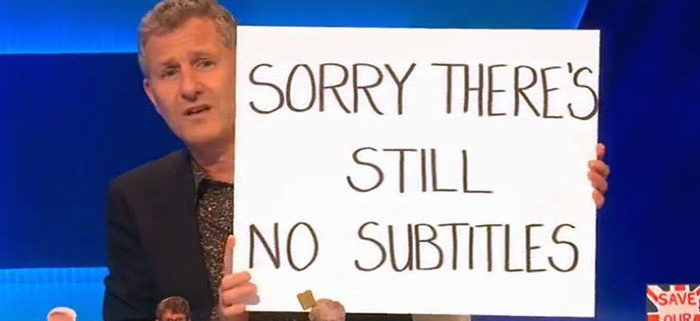Offline captioning – what it is and why you need it
The vast majority of videos online unfortunately do not have captions. This is somewhat changing with auto-generated subtitles, but it’s only scratching the surface. Every business that creates videos, whether it’s for public or in-house use, should have captions.
What is offline captioning?
Offline captioning is the simple act of adding captions to a video after the fact, in other words, a video that is not watched live.
Offline captions come in two different forms, subtitles and closed captions.
Subtitles show what’s being said on screen, so either the dialogue between characters or what the narrator is saying in a voiceover. Subtitles are usually found in foreign movies, when the viewer can’t understand the original language, but can still hear the original dialogue and sound effects.
Closed Captions are slightly more encompassing than subtitles. They not only show what is being said on screen, but they will also show other sounds and music that are happening. Closed captions can include the emotion of an actor’s voice, a glass smashing offscreen, or a buildup of tense or dramatic music.
The difference between live and offline captioning
Live captioning is a way for a transcript of what’s being said to appear live as the speaker is talking, making them very different from offline captioning.
Usually, live captioning is done with a stenographer in the room, typing at a staggering 300 words per minute to keep up with what’s being said.
Live captioning can also be done remotely, without the person in the room. In fact, a remote captioner with a good internet connection can be anywhere in the world!
In the UK, verbatim captioners are known as palantypists, stenographers, or Speech to Text Reporters. In the USA they are known as CART writers, and in some European countries as Speech to Text Interpreters.
Why you need offline captioning
The first and most important reason for using captioning is accessibility.
It’s estimated by the World Health Organisation that 1-in-10 people will have disabling hearing loss by 2050, with almost half a billion people suffering at the moment.
That’s a significant portion of the population who are at a disadvantage when it comes to watching videos. It’s essential that captions are used to help those hard of hearing if we want true equality in society.
As well as moral and ethical reasons for captioning on all videos, there is also a practical advantage.
With so much online content now available, video SEO is used to help search engines find videos and rank them in their results page.
The algorithms used to rank videos don’t listen to them, but they do read the text associated with them. Closed captioning and subtitles provide a searchable text that the likes of Google can use to rank your video.
It’s also been proven that people remember better when they see something rather than when they hear it, so reading along with a video helps focus, engagement, and memory, especially important for educational videos.
Talk to us about captioning
In the world of TikTok, Instagram and YouTube, video content is king.
If you want to stand out from the crowd, broadcast your message to EVERYONE, including the millions of people out there who are hard of hearing, then you need to add captions to your videos.
With years of experience and hundreds of satisfied clients, you can rely on us for all your offline captioning requirements.
All our captioning work is checked and re-checked as part of our commitment to quality, with time-coding, translations, and mastering all available upon request.
In fact, we are so confident in our work and professionalism, we offer a no-quibble money-back guarantee if you’re not happy with our final result.
Contact us today to find out more about our offline captioning services, and one of our friendly team members will be in touch as soon as they can.




Leave a Reply
Want to join the discussion?Feel free to contribute!